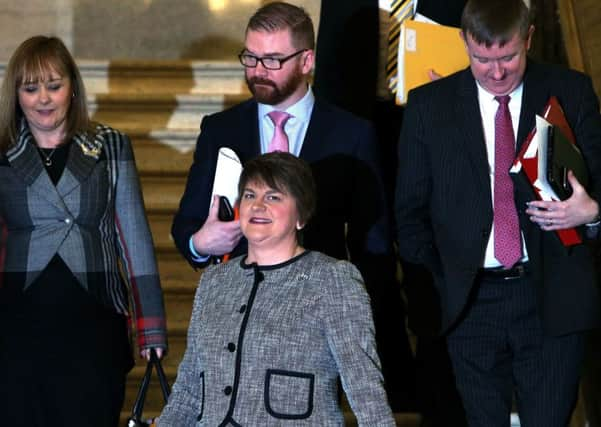Ben Lowry: Foster and her team are perhaps too youthful


It is youthful and women make up half the positions.
So discrimination is banished.
Or is it? What about the input of older folk?
Arlene Foster is 45, Michelle McIlveen is 44, and Simon Hamilton is a mere 38. Until Tuesday, Mervyn Storey was the eldest of them –at 51, hardly an old dog.
This reflects a global trend in politics towards the young, and I am unsure it is a good one.
Advertisement
Hide AdAdvertisement
Hide AdWe often hear about fresh teams taking over companies and governments, and sometimes even hear talk of dinosaurs who have been replaced.
David Cameron became prime minister at the age of 43.
Tony Blair also became prime minister at the age of 43.
Barack Obama became American president at 47. Bill Clinton had been only 46.
This is a new trend. Only two out of the 44 presidents of the US were younger than Mr Clinton – one of them John F Kennedy, who was 43.
There are advantages to younger leaders, chief among them that they are typically much more in touch with the vast numbers of their electorates who are in their 20s and 30s than, say, a person of 70 will be. But there are disadvantages too.
Advertisement
Hide AdAdvertisement
Hide AdLet me give you the perspective of a 44-year-old man on all of this.
I was aged 32 when I did my first occasional news editing shifts (the first step above reporting). I recall well reporters coming to me and asking advice on how to handle a particular situation and not knowing the answer. It is not an agreeable feeling.
Typically I bluffed until I could quietly seek the counsel of someone who was further up the chain and more experienced than me.
Two things happen as you age.
First, you gain experience in the job so that you are much less frequently in a situation you have never been in before.
Advertisement
Hide AdAdvertisement
Hide AdSecond, when you do find yourself in that novel situation, you become much better at guessing the appropriate response, based on sheer life experience.
There is a good reason why people tend not to be promoted to the top level in jobs, such as consultant grade for a doctor or QC for a barrister, until they are at least 35 or 40. In some jobs where wisdom and experience is essential, such as being a judge, that age is around 50.
My own view is that Margaret Thatcher was the ideal prime ministerial age: 53 on entering Downing Street and 65 leaving it. It is a combination of youthful fitness and older wisdom.
Perhaps now with rising life expectancy the ideal prime ministerial or presidential age is well into the 60s.
Advertisement
Hide AdAdvertisement
Hide AdOlder politicians have long knowledge of pitfalls. Ken Clarke types witnessed things that went wrong 40 years ago.
I suspect that the 2003 Iraq war (which I supported aged 31 but now accept was disastrous) might have been averted with older leaders (although some of the key American cheerleaders were 60+).
The brilliant journalist Max Hastings, 70, has blamed a ‘boy scout’ mentality in Downing Street for the 2011 Libyan intervention blunder.
This is not to criticise Mrs Foster and her team (which now includes Lord Morrow, 67). Nor is it to say that old is necessarily better. Plainly a brilliant 35-year-old leader is preferable to an incompetent 60-year-old one.
Advertisement
Hide AdAdvertisement
Hide AdOne able DUP MLA Peter Weir, who has not yet held office, is clearly ready for it at 47.
I just think the current DUP ministers will often need the advice of experienced civil servants – if there are many of them left who have survived early redundancy schemes.
Ben Lowry (@BenLowry2) is News Letter deputy editor